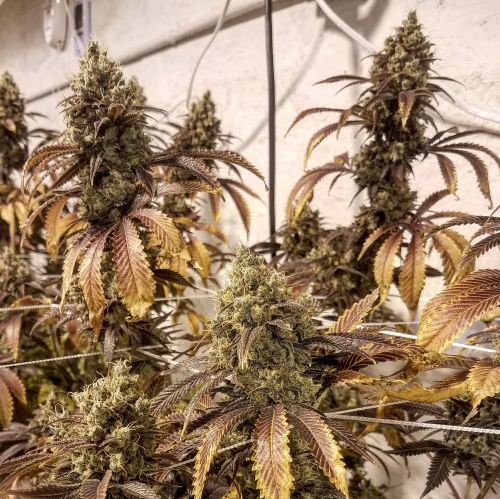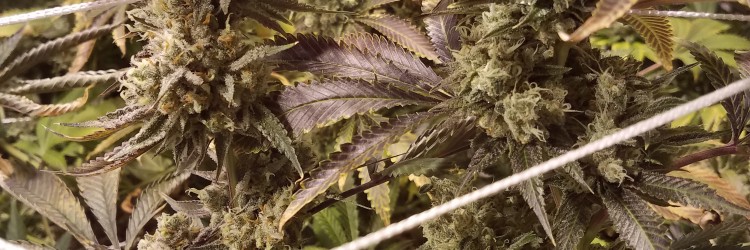News | September 19th, 2018

by Jacques Harvieux
jacquesthejock@gmail.com
North Dakota is set to vote on legalizing recreational marijuana this coming midterm election in November. In the last couple months leading up to the election, an opposition group, “North Dakotans Against the Legalization of Recreational Marijuana (NDATLORM),” has been formed. The group itself has very little information about itself, no platform, no website, no administrative structure, all the while having membership comprised of judges, attorneys general, and politicians.
Of the known members of the group are; Norm Robinson, owner of Norm Robinson Consulting, Bob Wefald, retired North Dakota Attorney General and District Court Judge, and Wayne Stenehjem, current North Dakota Attorney General. An article released on September 6th by Bismarck News - MyNDNow, quotes the North Dakota Attorney General.
“He helped to start a coalition called ‘North Dakotans Against the Legalization of Recreational Marijuana.’ Its goal is to inform residents of what they’re voting on, saying it’s the most liberal rec marijuana legislation in the country. The chief law enforcement officer of North Dakota says voting yes would be a mistake. Wayne Stenehjem, ND Attorney General: “There are an exceedingly high number of unintended consequences. The measure is poorly drafted and not well thought out. It is bad for North Dakota.”
The office of the North Dakota Attorney General was reluctant to answer any questions regarding Stenehjem’s involvement.
High Plains Reader: I’m trying to reach the Attorney General, so he can comment on his involvement with the North Dakotans Against the Legalization of Recreational Marijuana.
Attorney General’s Secretary: We have no comment other than that was presented to the legislative management committee today.
Norm Robinson and Bob Wefald of the NDATLORM were also reached for comment.
HPR: Your group is relatively new, you are just getting started. Is your group non-profit?
Robinson and Wefald: No, we are just a committee organized, we have not incorporated or anything like that. Just a political committee.
HPR: If you guys were to have an actual platform, what would your platform be?
R and W: Vote no on Measure 3. If it passes, it will turn North Dakota into the wild wild West. It will be totally unlimited, uncontrolled, unregulated marijuana, as much as you want, anywhere you want and marijuana will be the supreme law of the land. Any law conflicting with marijuana is essentially null and void.
HPR: Do you have an issue with legalization itself or just this bill?
R and W: This bill is what we are voting on and this bill is horrible. No taxes, no revenue stream in it, no rules and regulations. The only thing it has, it has three things that are illegal: It’s illegal to possess under 21, illegal to distribute to anyone under 21, and illegal to sell to anyone under 21. Other than that, driving under the influence of marijuana doesn’t apply, smoking in public places doesn’t apply, and zoning laws won’t apply. It’s going to be the wild wild West.
HPR: Like the medical marijuana bill, would you be okay North Dakota legislation tailoring the bill once it passes?
R and W: Absolutely not. If it gets into law it goes into effect 30 days after the election. After the election, it’ll still be two months before the legislature meets. For the legislature to overturn it or amend it, it’ll take a two-thirds majority vote of both houses. After the beating they took for turning the medical marijuana bill into a good law for North Dakota, I don’t know what kind of stomach they are going to have for doing work on recreational marijuana. Which I really call reckless marijuana. Because there is no control, it’s totally unregulated.
HPR: In what capacity has the Attorney General been involved with the coalition?
R and W: He has taken a public stance against Measure 3. He thinks it is his duty to do that, because he thinks it is a horrible law. It would create bad bad law for North Dakota. He has been at committee meetings and he’s spoke to me about this bill. I read the bill, and I signed on because this is a bad bad bill.
HPR: Final question, I’ve heard rumors you guys are trying to open an office in Downtown Fargo, is that true?
R and W: No.
Robinson and Wefald are not alone in some of these beliefs. An August 26th article in the Inforum websiterevealed that Fargo Police Chief David Todd and Cass County Sheriff Paul Laney agreed, saying, “If passed, the measure would prevent officers from enforcing DUI laws when drivers are impaired by marijuana.” On September 18th, the Cavalier County Sheriff posted a quote on Facebook from their Sheriff, Greg Fetsch. “As Sheriff of this great county, I have to ask everyone to think very hard about the legalization of marijuana. The North Dakota Sheriff’s Association is opposing it the way the bill is written. It needs to be rethought and done right.
I am also .including a website that you can check out to see what has happened in Colorado as a result of legalization of marijuana. www.rmhidta.org.”
 The website Sheriff Fetsch provided is for “The Rocky Mountain High Intensity Drug Trafficking Area” (HIDTA), a federal program established by the White House Office of National Drug Control Policy (ONDCP) in 1996. The mission of HIDTA is, “to support the national drug control strategy of reducing drug use.” The program has 30 counties in four states, including Colorado, Montana, Utah, and Wyoming. The report Sheriff Fetsch and many others are often referring to is called “The Legalization of Marijuana in Colorado: The Impact Volume 5.”
The website Sheriff Fetsch provided is for “The Rocky Mountain High Intensity Drug Trafficking Area” (HIDTA), a federal program established by the White House Office of National Drug Control Policy (ONDCP) in 1996. The mission of HIDTA is, “to support the national drug control strategy of reducing drug use.” The program has 30 counties in four states, including Colorado, Montana, Utah, and Wyoming. The report Sheriff Fetsch and many others are often referring to is called “The Legalization of Marijuana in Colorado: The Impact Volume 5.”
The language of the report can be somewhat misleading, with statements like “65 percent of local jurisdictions in Colorado have banned medical and recreational marijuana business,” when it fails to mention that that law only applies to unincorporated land within the county.
For example, the City of Aurora, an incorporated town, can allow retail marijuana sales despite being part of both Arapahoe and Douglas counties, which prohibit the business. The report also claims that, “Since recreational marijuana was legalized, marijuana-related traffic deaths increased 151 percent while all Colorado traffic deaths increased 35 percent.” But then goes on to say, “less than half of drivers (42 percent) or half of operators (50 percent) involved in traffic deaths were tested for drug impairment,” contradicting the findings of the report itself.
Though the members of the anti-marijuana group, believe there are no regulations, no taxes, and no revenue stream, Measure 3 provides for quite a bit more than the anti-marijuana coalition would have a person believe. Dave Owen, chairman of Legalize ND and author of Measure 3, confirmed this and answered questions regarding Measure 3.
HPR: In a Valley News Live article, the vote no coalition was quoted saying, “If Measure 3
passes it would be a bad law, specifically the vote no group says it will not be against the law to drive while stoned. It also says people will be able to smoke marijuana pretty much anywhere and that its distribution would be for the most part unregulated.” What do you have to say to that?
Dave Owen: No, it does not legalize driving while intoxicated. This does not repeal the relevant driving statutes and under no way can you reasonably infer what we create a “non-violent marijuana activity” to mean in the law, to constitute “while driving under the influence.” As a result, because we did not specifically repeal the DUI section and since we make no efforts to define a “non-violent marijuana related activity” as driving under the influence, in our statements the law is not repealed because it is deemed not a marijuana-related activity per the guidelines of the law created.
Simply, no it does not in any way, shape, or form.
The deregulation of selling, they are actually correct, it is very deregulated in the same way ideally businesses are deregulated. People want to talk about letting businesses do what they should, letting the market solve problems, we believe in free markets presumably, we are a conservative state, so we created a very free market model. Basically, you are going to have to pay whatever the Secretary of State charges for a business license now, I think it’s a $135. And then you have to get a tax ID number, our good ol’ friends at the IRS, and then from there you’ll be able to sell.
So that part, they are right.
Concerning smoking in public, they are mostly wrong.
The one or two areas they are not wrong, they can change very easily. Anywhere that has a ban on public smoking, would also have a ban on smoking marijuana. It comes with the way the smoking ordinances are written. Same thing as vape, they can stop you from vaping on the streets of NDSU, because even when vapes were created they didn’t have to rewrite the law to include vapes. It was already covered, by what it produced, people can debate whether or not it is, but legally speaking vape is a smoke. Therefore it is within the anti-smoke ordinance.
HPR: In an article by MyNDNow, Wayne Stenehjem was quoted in saying, “There are an exceedingly high number of unintended consequences. The measure is poorly drafted and not well thought out. It is bad for North Dakota.” What do you say to that?
Owen: Well, let’s address what the measure actually does. The measure, seals records for those with prior convictions, so long as they were not selling to “children,” children being under 21 in this case.
It does not seal violent portions, only the marijuana records, so now they don’t have a felony. So what does that mean? They can go back to school, they can get student loans, they can get an apartment, they can get a better job, they can become a taxpayer, so I see that as a huge net positive to society.
You seal the record, and they can move on with their life and become a contributor to the North Dakota economy.
Second, I look at the simple amount of revenue this is going to raise. This is going to raise untold revenues. Our farmers in North Dakota haven’t gotten a raise for their wheat, I’d say since 1977. Where wheat was still worth more than it is today. In the mid to late 70s wheat was $5.50 a bushel. It’s now $5.10 a bushel. So they’ve actually seen almost a 10% pay cut in the price of wheat and it’s been 40 years. So it’s great for farmers because they can finally grow these crops that are going to have huge economic benefit.
An acre of hemp goes for about 90 cents a pound, according to the North Dakota Department of Agriculture, at their event they just hosted in Grand Forks, this last weekend. Compare that to an entire bushel of corn that goes for $3 and some change. A bushel of eared corn is 70 lbs. So it’s a huge boom for the farmers that grow hemp and it’s a huge boom for the farmers that grow marijuana itself, flower.
And ultimately, what’s good for farmers is what’s good for this state, because of how our economy revolves around them.
A vote no, also does not make sense from a justice perspective. If I were to get into my car right now, have six beers and go drive down the highway, I would be in a very serious situation where I could potentially kill someone, okay? And the penalty for that is basically non-existent, it’s a $500 fine and a couple days in jail.
By way of comparison, if I have a gram of marijuana in my apartment, because of where it’s located -- I am within a 1,000 feet of UND -- it’s an automatic felony. I would be harming literally nobody, but that’s the reality of the situation.
 It makes sense from a dollars and cents perspective because we spend $40,000 per year per marijuana offender we send to prison. Tuition at NDSU is about $8,000 per year, and you could potentially send up to five people to college with that money in comparison to sending one person to prison for pot. So I think this bill is great for North Dakota, because it fixes all those problems.
It makes sense from a dollars and cents perspective because we spend $40,000 per year per marijuana offender we send to prison. Tuition at NDSU is about $8,000 per year, and you could potentially send up to five people to college with that money in comparison to sending one person to prison for pot. So I think this bill is great for North Dakota, because it fixes all those problems.
North Dakotans have much to decide upon come the election in November. Bradley Foster, a senior at NDSU and President of Students for Sensible Drug Policy, explained the feelings of those in the organization and much of campus. The anti-marijuana coalition’s tactics and reasons for voting no in November were “not very reputable and mimic many of the same tactics that anti groups used in Colorado to stop the passing of recreational marijuana there, tactics that include misinformation, so what’s most important before everybody goes to vote is that they get their facts straight.”
Anybody can read and look over Measure 3 and what it entails anytime on Ballotpedia.org.
February 16th 2026
January 27th 2026
January 27th 2026
January 26th 2026
January 24th 2026
__293px-wide.jpg)

_(1)_(1)_(1)_(1)_(1)__293px-wide.jpg)

_(1)__293px-wide.png)
